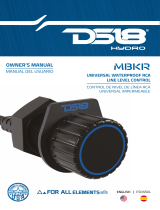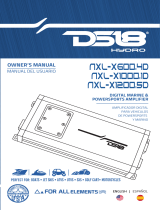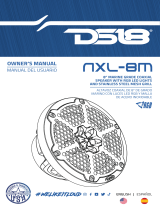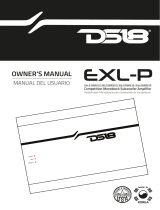DS18 Hydro Full Range Digital Marine Monoblock AMP El manual del propietario
- Categoría
- Amplificadores de audio para automóviles
- Tipo
- El manual del propietario
El DS18 Hydro Full Range Digital Marine Monoblock AMP es un potente amplificador marino diseñado para brindar un sonido de alta calidad en entornos marinos hostiles. Con una potencia RMS de 600 vatios a 1 ohmio, este amplificador puede impulsar fácilmente incluso los subwoofers más exigentes. También cuenta con un crossover variable incorporado, lo que le permite personalizar el sonido para adaptarse a sus preferencias y a las capacidades de sus altavoces.
El DS18 Hydro Full Range Digital Marine Monoblock AMP es un potente amplificador marino diseñado para brindar un sonido de alta calidad en entornos marinos hostiles. Con una potencia RMS de 600 vatios a 1 ohmio, este amplificador puede impulsar fácilmente incluso los subwoofers más exigentes. También cuenta con un crossover variable incorporado, lo que le permite personalizar el sonido para adaptarse a sus preferencias y a las capacidades de sus altavoces.


















-
 1
1
-
 2
2
-
 3
3
-
 4
4
-
 5
5
-
 6
6
-
 7
7
-
 8
8
-
 9
9
-
 10
10
-
 11
11
-
 12
12
-
 13
13
-
 14
14
-
 15
15
-
 16
16
-
 17
17
-
 18
18
DS18 Hydro Full Range Digital Marine Monoblock AMP El manual del propietario
- Categoría
- Amplificadores de audio para automóviles
- Tipo
- El manual del propietario
El DS18 Hydro Full Range Digital Marine Monoblock AMP es un potente amplificador marino diseñado para brindar un sonido de alta calidad en entornos marinos hostiles. Con una potencia RMS de 600 vatios a 1 ohmio, este amplificador puede impulsar fácilmente incluso los subwoofers más exigentes. También cuenta con un crossover variable incorporado, lo que le permite personalizar el sonido para adaptarse a sus preferencias y a las capacidades de sus altavoces.
en otros idiomas
Artículos relacionados
-
DS18 EN-DF10A El manual del propietario
-
 DS18 ZR500.1D El manual del propietario
DS18 ZR500.1D El manual del propietario
-
DS18 ZR500.1D 4 Channels Class Stereo Full Range Amplifier El manual del propietario
-
 DS18 MBKR El manual del propietario
DS18 MBKR El manual del propietario
-
 DS18 MP.4A El manual del propietario
DS18 MP.4A El manual del propietario
-
 DS18 NXL-X600.4D El manual del propietario
DS18 NXL-X600.4D El manual del propietario
-
 DS18 NXL-8M 8 Inch Marine Grade Coaxial Speaker El manual del propietario
DS18 NXL-8M 8 Inch Marine Grade Coaxial Speaker El manual del propietario
-
DS18 EXL-P Series El manual del propietario
-
 DS18 EXL-P1500X1D El manual del propietario
DS18 EXL-P1500X1D El manual del propietario
-
 DS18 DSP8.8BT El manual del propietario
DS18 DSP8.8BT El manual del propietario
























